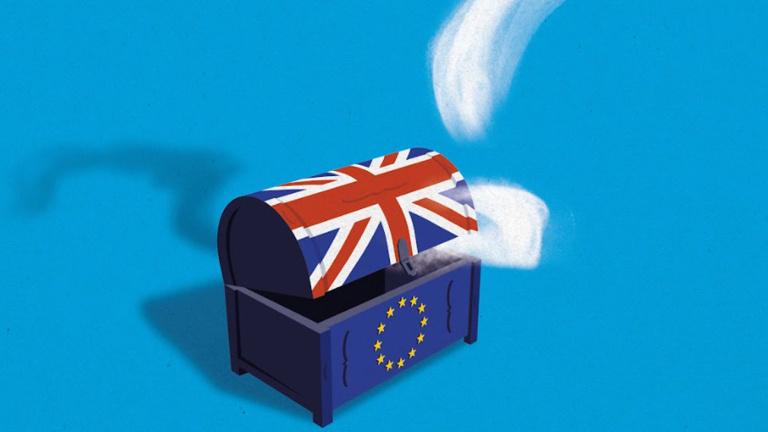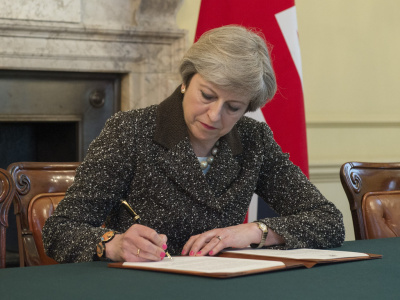
Time to close a deal is running out
There are real benefits to continued EU-UK cooperation on development policy after Brexit, but the window of opportunity to close a deal is tight and closing fast. With the clock ticking towards the Brexit date of 29 March 2019, many questions remain about how Brexit may affect EU development policy.
Brexit poses risks for both sides. The UK risks a loss of influence and reduced reach of its soft power, while the EU stands to lose not only one of its largest donors, but also a strong voice in the Council of Ministers and globally for development policy. This is happening against a shifting policy background, as the EU institutions begin negotiations on the next EU budget – the multiannual financial framework (MFF) for 2021 onwards. A lot is therefore at stake in the next 12 months.
UK will meet spending commitments, but details are short on new relationship
The Brexit negotiations are being conducted in two phases: the divorce settlement (budget, citizens’ rights, Northern Ireland), on the one hand, and the transitional arrangements as well as the future relationship, on the other. In terms of phase 1, sufficient progress was made. For the current MFF, the UK is contributing around €7.1 billion to the EU’s development budget, covering the Development Cooperation Instrument (DCI), the European Development Fund (EDF), and the Humanitarian Aid Instrument (HAI). Under the terms of the transition deal announced on 19 March, the UK agreed to honour its commitments to the EU budget and the EDF. This is important, because it means no budget hole and no difficult discussions to plug the gap. In terms of phase 2, the future relationship, we have few details: at the time of writing, the remaining issues under the draft withdrawal agreement and the future relation are being discussed. Speaking in February in Munich, UK Prime Minister Theresa May said, ‘if a UK contribution to EU development programmes and instruments can best deliver our mutual interests, we should be open to that’.
In many ways, 2018 is a perfect window to define a new EU-UK relationship on development policy because the EU itself is taking a fresh look at its whole funding framework and programmes. Indeed, the current MFF expires on 31 December 2020 – the same day as the UK transitional deal ends. The European Commission’s proposals for the next MFF funding round (2021-2027), and the new spending programmes to replace the DCI and the EDF from 2021 onwards, will dominate the EU institutional agenda in this last year of the current European Parliament and Commission. At the same time, negotiations are under way on a replacement for the Cotonou Agreement with the Africa, Caribbean and Pacific (ACP) countries, which expires in 2020.
Clarity needed on the UK’s position
The UK government could use the time it has left as a full player at the EU negotiating table to influence these discussions. There have been no formal proposals from the UK so far, only two non-papers shared with the EU 27 and suggestions that the UK could contribute to specific EU development instruments post-Brexit. These could be ad hoc trust funds, the Africa Peace Facility (or its replacement), a new EDF separate from the EU budget, or investment funds like the new European Fund for Sustainable Development (EFSD). However, there are obstacles to realising this model. In exchange for financial support, the UK will doubtless want some say in how funds are spent. The EU 27 are cautious about anything that smacks of cherry picking, so they may be reticent about any special role for the UK, which by then will be a third country. Instruments that are open to third-country contributions, like the trust funds, are strongly contested by the European Parliament, which may want them scrapped under the next MFF, over which it has veto power. On the EDF, the Commission’s preferred option is ‘budgetisation’, a longstanding demand of the European Parliament, though contested by some governments. Even if the EDF remains a separate pot of bilateral money outside the budget, its rules would have to change to allow third countries to contribute. A parallel arrangement would also need to be found to allow the UK to remain party to the Cotonou agreement successor – more special rules that some may baulk at.
The other problem is the UK’s lack of clarity about what it is prepared to put on the table. Its approach seems to be to wait and see the new post-2020 EU development architecture and potentially opt in at a later stage. The EU 27 are unlikely to shape their new instruments to accommodate the UK by keeping the EDF off-budget, allowing third-country contributions and voting rights, or creating new off-budget instruments, unless they have more than warm words that the UK might participate.
The EU would benefit from continued cooperation
The EU 27 does have an interest in keeping the UK on board post-2020. The UK is well respected in international development, and there is a lot of goodwill among parliamentarians, ministers, and ambassadors from the EU 27 to stay close after Brexit. The UK was a major driver of the EU pledge to achieve the UN 0.7% aid target by 2015, and while the EU collectively has failed to meet it, the UK is one of only five EU countries to deliver – and the only one to have enshrined it in law. The EU is currently the world’s largest donor of bilateral aid, but its numbers include bilateral aid from its member states alongside the EU’s own contributions. Losing the UK will put a hole in these statistics unless other member states step up. The UK’s Department for International Development (DFID) has been one of the strongest supporters of the Commission Development (DEVCO) and Humanitarian Aid (ECHO) directorates’ policy agendas. It has pushed the gender dimension of development (see Gill Allwood’s contribution in this issue), untying aid (though recent UK policy is reversing this), improving aid effectiveness, and maintaining a strong focus on poverty reduction and fragile states. That support became more important in the “lean years” after the 2008 crash.
UK influence goes beyond government. The Commission has drawn heavily on the expertise of UK think tanks and NGOs on policy development and aid delivery. Post-Brexit, UK-based development organisations will no longer be eligible for EU funds or formally consulted on EU policy. There may be ways around this. Some may establish a base in Brussels or in another member state, while others may struggle to persuade their UK constituency of the need to lobby Brussels and network with partners.
The UK has most to lose
But the UK arguably has most to lose from failure to deliver on the deep and special partnership Theresa May often talks about. In the run up to the referendum, a UK government study stated, ‘[T]he EU’s geographical focus for its aid is broadly aligned with that of the UK… and the EU’s wider geographical coverage means that the UK can channel aid through it to reach countries the UK could not reach alone.’ That reach is key in fragile states, where the UK is committed to spending half of its aid and where the EU has a broader range of instruments and offers a more integrated approach to tackling problems. Joint programming and practical cooperation on the ground through EU delegations and enhance UK soft power could be lost.
It is worth remembering that given the law requiring the UK to spend 0.7% of its gross national income on aid, there is no “savings” to the UK treasury from not working through the EU. DFID has rated the EU more efficient than many other multilaterals, including UN agencies. If aid must be spent somewhere, why not through a tried and trusted partner.
Window of opportunity closing fast
In less than a year, UK ministers will no longer be at the Council table. DFID officials will no longer be members of EU working groups, and British European Parliamentarians will be gone. Influence will inevitably diminish. At the same time, there is a risk that the difficult MFF and Brexit negotiations will eclipse the positive role the UK could play as a partner in EU development policy. The window of opportunity to resolve these issues is tight and closing fast. We need progress.
About the author
Linda McAvan is a member of the European Parliament and chair of the European Parliament Committee on Development. She writes in a personal capacity.
Twitter: @LindaMcAvanMEP
Read the full magazine issue







